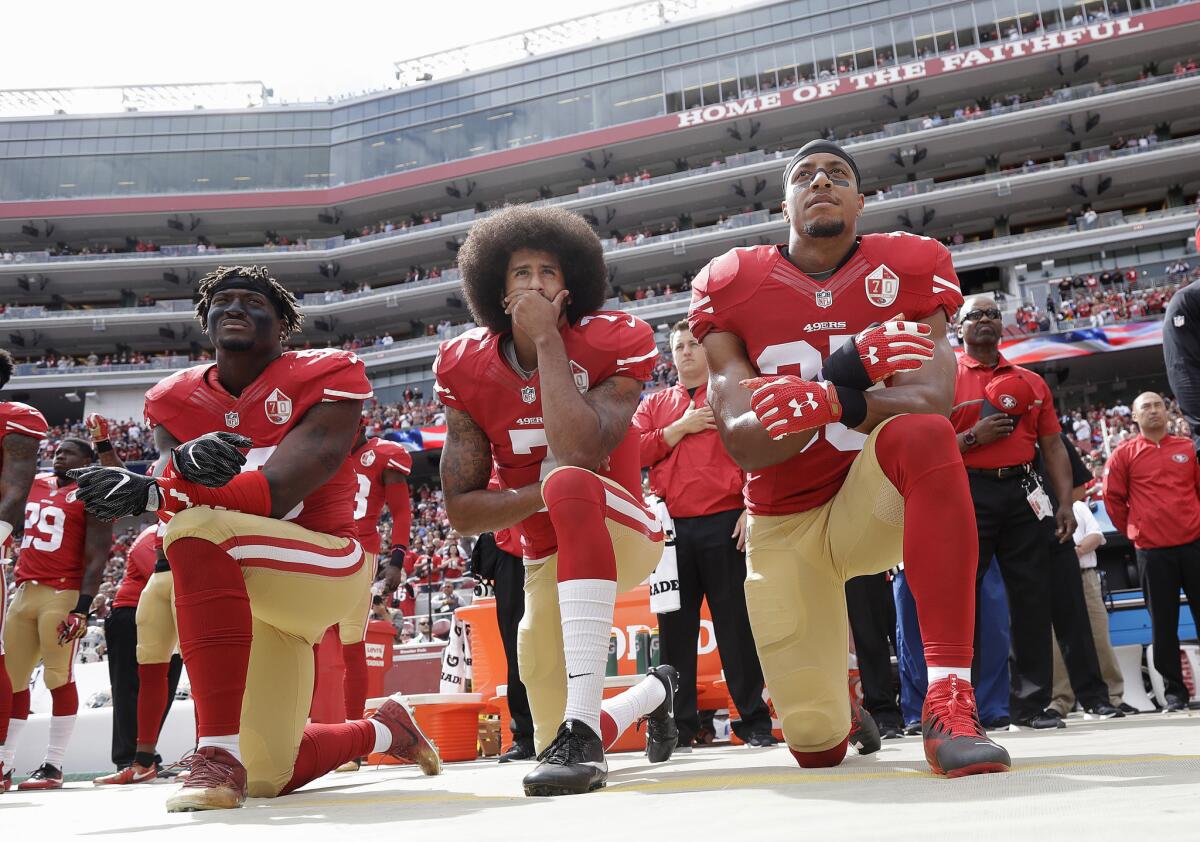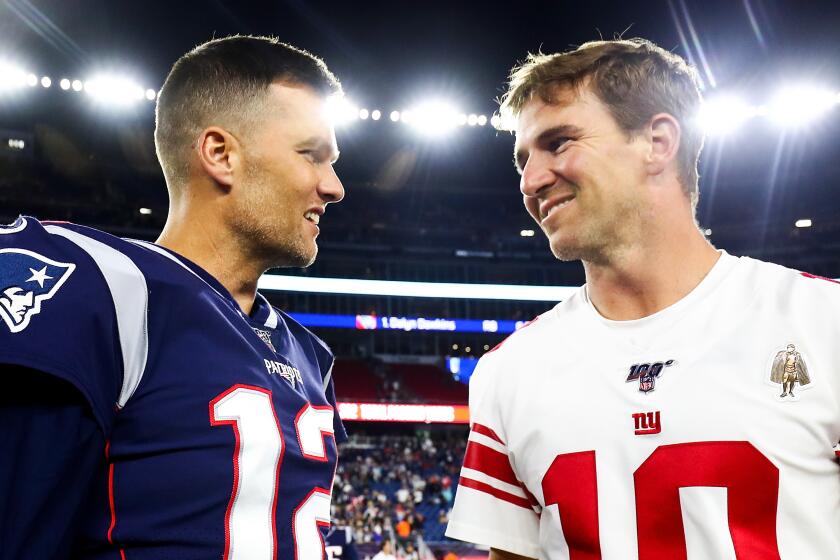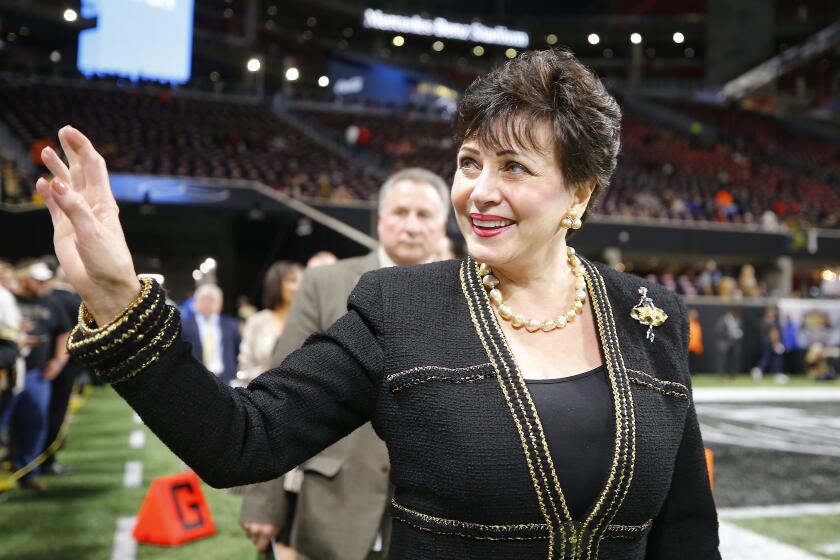Column: NFL should stop acting as if Colin Kaepernick never existed

- Share via
Oscar season is upon us and one of the feel-good stories is that of Cynthia Erivo. She is nominated in the best actress and best original song categories. If the 33-year-old wins one of them, she will become the youngest person to achieve the EGOT (an acronym for the Emmy, Grammy, Oscar, and Tony awards). Erivo, portrays Harriet Tubman in the movie “Harriet,” the story of a runaway slave who made numerous journeys from the north back to the south to rescue other slaves. This explains why when it was reported that one studio executive wanted Julia Roberts to play the lead, mouths dropped.
“The climate in Hollywood, however, was very different back then,” the film’s screenwriter Gregory Allen Howard said during a Q&A around the time of the film’s release. And when it was pointed out that Tubman was a black woman, the executive reportedly responded: “It was so long ago. No one is going to know the difference.”
The tale would be unbelievable had Jennifer Connelly not won an Oscar for portraying Alicia Lardé Nash in the 2001 film “A Beautiful Mind,” or if 2014’s “Exodus: Gods and Kings” had not cast Sigourney Weaver as an African queen.
Whitewashing history, however, isn’t something that only plagues Hollywood. Just look at what is happening with Colin Kaepernick.
In 2017, shortly after President Trump called the NFL players who were protesting during the national anthem “sons of bitches,” Sports Illustrated published a digitally altered cover with several athletes, coaches and owners locking arms with the U.S. flag as a backdrop with the phrase “A Nation Divided.”
The player who sparked those protests was not included. In 2018, Madden NFL 19 removed Kaepernick’s name from the song “Big Bank,” prompting Big Sean to tweet the edit was “disappointing” and “appalling,” and adding “nobody from my team approved any of this.” That tweet went viral prompting EA Sports to issue an apology and rectify the omission.
New England Patriots quarterback Tom Brady gives a classy and funny shout out to retiring New York Giants quarterback Eli Manning.
And there’s more.
When Raheem Mostert ran for 220 yards in the NFC Championship game, he set a franchise postseason record, breaking — wait for it — Kaepernick’s record. But that note was missing from the broadcast.
Still not convinced?
How about NFL Game Recaps, which is verified by Facebook, originally posting “The San Francisco 49ers are headed back to the Super Bowl for the first time since the 1994 season!” before social media noticed and a correction was made?
I was in the Mercedes-Benz Superdome in New Orleans in 2013 when the lights went out during the 49ers’ battle with the Baltimore Ravens. Two brothers faced off as head coaches for the first time. Beyoncé was the halftime performer. It was a fairly memorable occasion but clearly one the league would prefer we forget.
While the Rams’ new home at SoFi Stadium rises in Inglewood, the team is making sure they can improve after a 2019 season that “wasn’t up to our standards.”
Still think it’s a reach?
The NFL has now released a series of PSA’s advocating for criminal justice reform with not so much as a head nod toward the player who forced its hand to get involved in the first place. One of the PSA’s focuses on the murder of Botham Jean, the 26-year-old who was shot by Amber Guyger while eating ice cream on his couch in 2018.
Guyger, a former Dallas police officer, said she mistook his apartment for her own and did not mean to kill him. In 2016, Philando Castile was shot seven times by police officer Jeronimo Yanez, in Falcon Heights, Minn. Castile was in a car with his girlfriend and her 4-year-old daughter after a trip to the grocery store. Within 40 seconds of coming into contact with Yanez, Castile was shot. Yanez, who was acquitted of the charges, was fired immediately after the trial.
This is the death that inspired Kaepernick to begin his peaceful protest and ultimately led to the creation of the Responsibility Program and Inspire Change initiative. If the NFL now recognizes these senseless deaths as unacceptable, then why is it blackballing as opposed to celebrating Kaepernick?
It’s disgusting and insulting and when Commissioner Roger Goodell stands in front of the media for his annual conference during Media Week, he needs to be bludgeoned with questions regarding the league’s blatant hypocrisy. Saying the NFL has “moved on” from Kaepernick after that sham of a workout in Atlanta is akin to saying racism is behind us because the country elected a black man as president.
I know, I know — politics and sports should be separate. Please keep that same shut-up-and-dribble energy when Fox airs its interview with Trump during its pregame Super Bowl show.
To be clear: Kaepernick did not start the battle for racial equality. Nor is he a gatekeeper with the authority to decide who can or cannot be concerned about the issues in which his protest was based. In fact a sound argument can be made that a social justice activist who defends Fidel Castro and doesn’t bother to vote for the criminal justice reforms on the California ballot disqualifies himself from the discussion.
But that discussion is separate from how the NFL and those with business ties to the league clearly have made a series of steps that appear to make us forget. Not him as much as what the league did to him.
Goodell wants us to forget what Kaepernick did as a player so we won’t ponder why, when Philadelphia’s Carson Wentz was forced out of the wild-card game against the Seattle because of a concussion, the Eagles turned to a 40-year-old back up who had never played in a playoff game before (Josh McCown) as opposed to the 32-year-old postseason record holder who led his team to the Super Bowl. Because if we remember what Kaepernick did on the field, Goodell and company would have to own up to why they kept him off the field.
Saints attorneys say the emails were intended to be private and that any claims that the team helped the church cover up crimes are ‘outrageous.’
So songs are edited.
Accomplishments are overlooked.
Perhaps, business and media partners are squeezed.
All in an effort to make us believe the runaway slave who risked her life countless times to save others who were beaten, raped and held hostage was a white woman with long, flowing red hair because the truth is much too much to bear.
More to Read
Go beyond the scoreboard
Get the latest on L.A.'s teams in the daily Sports Report newsletter.
You may occasionally receive promotional content from the Los Angeles Times.














